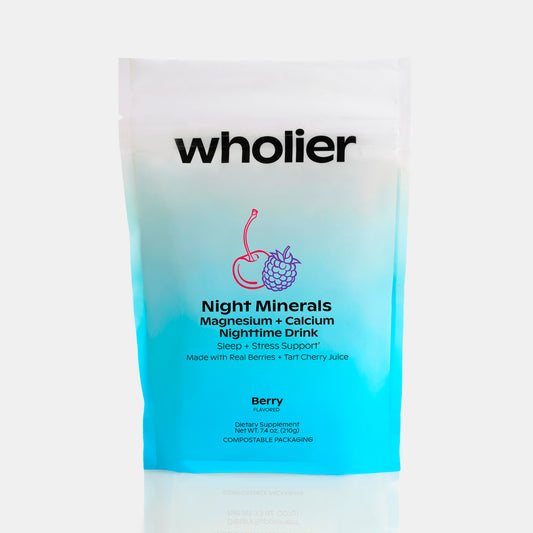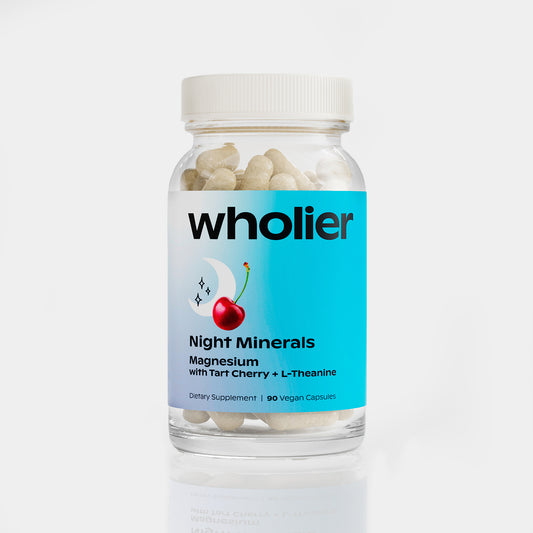
Magnesium Citrate vs. Magnesium Oxide: Which Is the Better Form?
Magnesium is an essential mineral that plays a crucial role in many bodily functions, including muscle and nerve function, blood pressure regulation, and bone health. However, many people don't get enough magnesium from their diet alone, which is why supplements can be an effective way to boost magnesium levels. Two popular forms of magnesium supplements are magnesium oxide and magnesium citrate, but what's the difference between them, and which one is better? Let's take a closer look.
What's Magnesium Oxide?
Magnesium oxide is a type of magnesium supplement that is commonly used to treat magnesium deficiency. It is made by combining magnesium with oxygen, and it is often sold in tablet or capsule form. Magnesium oxide is relatively inexpensive compared to other forms of magnesium supplements, which is why lower quality brands rely on this form in their supplements. But as we'll learn, not all forms of magnesium are created equal.
What's Magnesium Citrate?
Magnesium citrate is another form of magnesium that is often used to boost magnesium levels. It's made by combining magnesium with citric acid. One of the advantages of magnesium citrate is that it is more easily absorbed by the body than magnesium oxide. This is what you want if you're taking magnesium specifically for the health benefits it offers, like improved sleep, muscle recovery and digestion.
Which One Is More Effective?
Magnesium citrate wins in terms of effectiveness. Numerous studies have shown that magnesium citrate is more efficient than magnesium oxide at raising magnesium levels. For instance, in a study examining bioavailability, magnesium citrate showed approximately 16.2% bioavailability, while magnesium oxide had a bioavailability of about 4.03%. Essentially, magnesium citrate was found to be approximately four times more effective in boosting serum magnesium levels.(1)
Additionally, magnesium citrate has been shown to have a few specific health benefits that magnesium oxide does not have. For example, some studies have suggested that magnesium citrate may be effective at reducing the risk of kidney stones.(2) Another study found that magnesium citrate was more effective than magnesium oxide at reducing symptoms of constipation.(3)
Research suggests that magnesium citrate is four times more effective at raising serum magnesium levels compared to magnesium oxide.
All-in-all, if you want to experience the robust health benefits of magnesium, citrate is typically the better choice. That's why Night Minerals Magnesium + Calcium Drink uses magnesium citrate, instead of less effective magnesium oxide.
Are There Other Good Forms of Magnesium?
There are more than 10 different forms of magnesium, some are found primarily in ingestible supplements and others are found in topicals. The realm of magnesium is diverse, with each form boasting its own unique features and uses. For instance, consider magnesium glycinate, which is a blend of magnesium and the amino acid glycine. This form is known for its calming effects and can help enhance sleep quality and reduce anxiety. It's also gentle on the stomach, making it a great option for those with sensitive digestion. It's another form that can be found in our magnesium nighttime drink.
How Much Magnesium Should You Take?
The amount of magnesium you should take depends on several factors, including your age, gender, and overall health. In general, the recommended daily intake of magnesium is 400-420 mg for men and 310-320 mg for women.(4)
Magnesium is an essential mineral that plays a critical role in many bodily functions. While both magnesium oxide and magnesium citrate can be effective at raising magnesium levels in the body, magnesium citrate is typically a better option due to its higher absorption rate and specific health benefits. If you're interested in supplementing magnesium specifically for the sleep-related benefits, it's also worth considering other forms of magnesium, like glycinate. Combining a few different forms of bioavailable magnesium, as found in Night Minerals, allows you to reap the benefits of each.
Sources:
(1) Firoz, Mansoor, and Michael Graber. 2001. "Bioavailability of US Commercial Magnesium Preparations." Magnesium Research 14, no. 4: 257-62.
(2) Kasiske BL, Ascher NL, Najarian JS, et al. The effectiveness of potassium citrate in preventing recurrent calcium oxalate stones. A randomized, double-blind, placebo-controlled trial. Ann Intern Med. 1992 Feb 15;116(4):268-73. doi: 10.7326/0003-4819-116-4-268. PMID: 1739220.
(3) Coudray C, Bellanger J, Castiglia-Delavaud C, et al. Effect of magnesium supplementation on glucose metabolism in people with or at risk of diabetes: a systematic review and meta-analysis of double-blind randomized controlled trials. Am J Clin Nutr. 2013 May;97(5):1142-9. doi: 10.3945/ajcn.112.053132. Epub 2013 Apr 3. PMID: 23553179.
(4) Office of Dietary Supplements - Magnesium. (n.d.). Retrieved April 28, 2023, from https://ods.od.nih.gov/factsheets/Magnesium-HealthProfessional/






